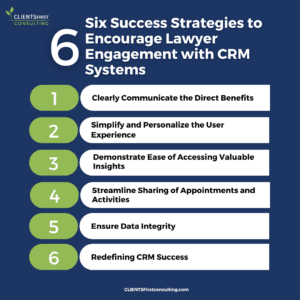In today’s legal landscape, marked by rapid change and high demands on time, the integration and effective use of CRM (Customer Relationship Management) systems is not just a technological upgrade but a critical pivot towards operational excellence and client service enhancement.
Overcoming the inherent resistance to change in legal environments is essential, as the successful adoption of CRM systems directly correlates to a law firm’s efficiency, client relationship management and ultimately, its competitive edge. Embracing a strategic approach that prioritizes value, simplicity and efficiency is key to unlocking the potential of CRM systems.
This approach can transform them from mere administrative tools to indispensable assets for business development and client engagement. Here, we outline six pivotal strategies to facilitate this transformation and elevate CRM adoption among attorneys, ensuring that your firm not only keeps pace with the industry’s evolution but leads it.
- Clearly Communicate the Direct Benefits
- Strategy: Explicitly explain how the CRM system benefits the individual lawyers, not just the organization.
- Implementation: Conduct workshops or one-on-one sessions demonstrating how CRM usage can streamline their marketing and business development efforts, ultimately leading to personal success and client satisfaction.
- Simplify and Personalize the User Experience
- Strategy: Opt for CRM systems with user-friendly interfaces and customizable dashboards that align with the daily needs of lawyers.
- Implementation: Choose CRMs that can integrate seamlessly with other systems lawyers use daily, like billing and document management, to create a centralized, efficient workspace.
- Demonstrate Ease of Accessing Valuable Insights
- Strategy: Show lawyers how they can independently derive valuable insights from CRM data with minimal effort.
- Implementation: Regularly schedule sessions with marketing professionals to assist lawyers in updating and extracting relevant contact information and insights from the CRM.
- Streamline Sharing of Appointments and Activities
- Strategy: Select a CRM system that facilitates easy sharing of appointments and activities, allowing marketing teams to provide proactive support.
- Implementation: Implement features where marketing professionals can access attorneys’ schedules to prepare strategic materials and insights for upcoming client or prospect meetings.
- Ensure Data Integrity
- Strategy: Maintain accurate and up-to-date CRM data to ensure reliability.
- Implementation: Establish a regular data cleaning process, which can be outsourced if necessary, to maintain the CRM’s integrity and usefulness.
- Redefining CRM Success
- Strategy: Shift away from traditional models that heavily rely on attorneys for data entry.
- Implementation: Adopt newer CRM approaches where the bulk of data entry and management is handled by support staff or automated systems, reducing the burden on attorneys and focusing their involvement on strategic input and relationship management.

Conclusion: A Value-Driven Approach
The cornerstone of successful CRM adoption lies in the “value exchange.” By making it straightforward for attorneys to contribute and extract value from the CRM, law firms can foster a culture of active participation. While the journey to full CRM adoption is gradual, the investment in these modern strategies is crucial for long-term benefits, enhancing both the efficiency of lawyers and the overall success of the firm.